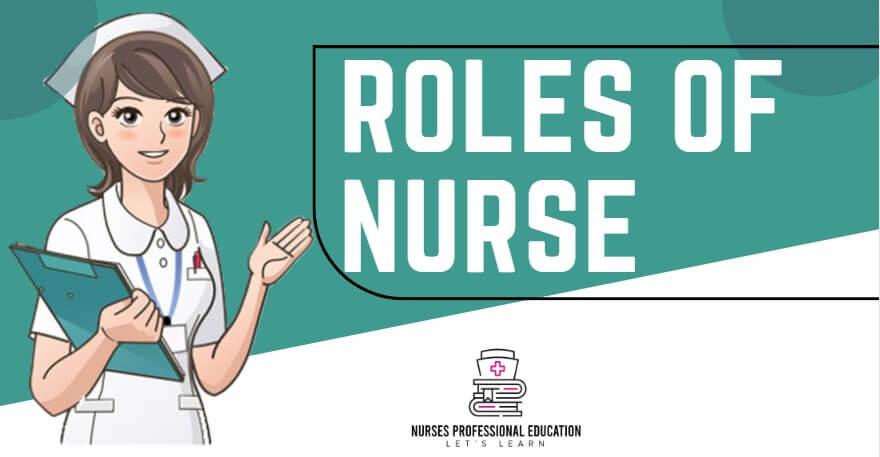Fundamental of Nursing /Roles of Nurses in Health Care
Table of Contents
Professional:
A professional is a member of a profession or any person who earns a living from a specified professional activity.
Characteristics of a Profession:
- A basic requires an extended education of its members, as well as a liberal foundation.
- A profession has a theoretical body of knowledge leading to defined skills, abilities and norms.
- Members of a profession have autonomy in decision-making and practice.
- The profession has a code of ethics for practice.
- Integrity is maintained by adherence to a code of conduct.
- Service is provided for public good.
Description of Career Roles:
- Communicator
- Teacher
- Counselor
- Leader
- Manager
Roles of Nurse

Description of Roles of Nurse as Communicator:
- Communication is the process of exchanging information and generating and transmitting meanings between two or more individuals.
- Any nurse who wishes to be an effective caregiver must first learn how to be an effective communicator.
- Communication skills are the building blocks of professional relationships between nurse and patient, nurse and nurse, and nurse and other health-team members.
The Process of Communication:
- This communication process is initiated based on a stimulus.
- The sender or source (encoder) of the message is a person or group who initiates or begins the communication process.
- The message is the actual physiologic product of the source. It might be a speech interview, conversation, chart, gesture, memorandum, or nursing note. The channel of communication is the medium the sender has selected to send the message.
- The channel might target any of the receiver’s senses.
- Confirmation of the message provides feedback.
Forms of Communication:
Verbal Communication is an exchange of information using words, including both the spoken and written word.
Non-verbal Communication The transmission of information without the use of words is termed non-verbal communication, also known as body language
Intrapersonal communication, or self-talk, is the communication that happens within the individual.
Interpersonal communication occurs between two or more people with a goal to exchange messages.
Group communication includes small-group and organizational group communication.
Conversation Skills:
- Control the tone of your voice so that you are conveying exactly what you mean to say and not a hidden message.
- Be knowledgeable about the topic of conversation and have accurate information
- Optimal pacing Consider the pace of any conversation or encounter with a patient.
- Assess a patient’s personal space through careful observations of non-verbal communication.
- Be clear and concise.
- Be truthful.
- Keep the conversation as natural as possible, and avoid sounding overly eager.
- If culturally appropriate, maintain eye contact with the patient, without staring, in a face-to-face pose.
- Indicate that you are paying attention to what the patient is saying by using appropriate facial expressions and body gestures. Be attentive to both your own and the patient’s verbal and non-verbal communication.
- Think before responding to the patient. Responding impulsively tends to disrupt communication and listening.
- Do not pretend to listen. Most patients are sensitive to an attitude of feigned attention or to boredom and apathy.
Role of a Nurse as a Counselor:
- Counselling is the interpersonal process of helping patients to make decisions that promote their overall well-being.
- Patient education is the process of influencing the patient’s behavior to effect changes in knowledge, attitudes, and skills needed to maintain and improve health. Research supports the fact that educated patients experience better health and have fewer complications
- The basic purpose of counselling is to help patients and families develop the self-care abilities
- Counselling provides the resources and support patients need to participate actively in self-care and to facilitate their coping with what cannot be changed
- Maintaining and Promoting Health
- Preventing Illness
- Restoring Health Once a patient is ill, counseling focus on developing self-care practices that promote recovery
- Facilitating Coping Developmental lifestyle changes and acute, chronic, and terminal illness all place demands on patients and families that may become overwhelming.
Types of Counseling:
Short-Term Counseling:
Focuses on the immediate problem or concern of the patient or family. It can be a relatively minor concern or a major crisis, but in any case, it needs immediate attention. Short-term counseling might be used during a situational crisis, which occurs when a patient faces an event or situation that causes a disruption in life.
Long-Term Counseling:
extends over a prolonged period. A patient might need the counsel of the nurse at daily, weekly, or monthly intervals. A patient experiencing a developmental crisis, can occur when a person is going through a developmental stage or passage.
For example, many women going through menopause need assistance when adjusting to the changes they experience. Long-term counseling may occur in nurse-led support groups.
Motivational interviewing:
Motivational interviewing is an evidence-based counseling approach that involves discussing feelings and incentives with the patient.
Referrals:
Referrals Sometimes a patient needs specialized counseling by nurses with advanced training or by other healthcare professionals. In these cases, offer to refer the patient to the appropriate professional (e.g., psychiatric or mental health nurse, psychologist or psychiatrist)
Role of a Nurse as a Teacher:
- Acquire knowledge about diabetes as a disease process and related medical management and self-care
- Value health sufficiently to make certain lifestyle modifications (attitude).
- Master certain skills, such as insulin injection.
- The science of teaching (called pedagogy) generally refers to the teaching of children and adolescents
- In recent years, however, the study of teaching adults (andragogy) has gained more attention
Role of a Nurse as a Leader:
- Leadership has been described as the ability to direct or motivate an individual or group to achieve set goals.
- Leadership Skills The four basic skills needed for nursing leadership listed below:
- Communication skills
- Problem-solving skills
- Management skills
- Self-evaluation skills
Areas of Leadership:
Patient Care Coordination Even new graduate nurses have leadership responsibilities when they begin nursing. Nursing leadership begins with nursing care of the individual patient.
Employee Responsibilities Nurses have specific tasks or duties to perform.
Nursing Care Delivery Models of nursing care, Over time, these have evolved from highly technical, industrial-based, assembly-line models to more professional, self-managed, cross-functional methods.
Guidelines for Delegating Nursing Care New graduate nurses use leadership techniques when they direct the work of nonprofessional staff and volunteers and consider delegating tasks to nonprofessional staff.
Role of a Nurse as Manager:
The roles of nurse in management is to plan, organize, direct, and control available human, material, and financial resources to deliver quality care to patients and families. The managerial role is frequently conceptualized as the technical dimension of formal leadership roles.
Planning: identifying problems and developing goals, objectives, and related strategies to meet the demands of the clinical arena
Organizing: acquiring, managing, and mobilizing resources to meet both clinical and financial objectives
Directing: leading others in achieving goals within the constraints of the current fiscal and workforce shortage scenarios. This is a demanding task for managers and staff alike.
Controlling: implementing mechanisms for ongoing evaluation, particularly in areas of clinical quality and financial accountability
Conflict Management Nurse managers frequently encounter conflict between employees and between themselves and employees. Unresolved conflict can lower morale and threaten quality care
Roles of Nurse Complete PowerPoint Presentation
What are 10 roles of a nurse?
Roles of nurses can not be bonded to any number, because there are different situations and different scenarios where nurse have to play different roles, for example as a caregiver, advocate, manager, educator, counselor, researcher, collaborator, leader and a lot more.
What are nursing roles?
Nursing roles are like a basic characteristic, which reflects upon different stages and situation.
References:
Taylor, C. (2011). Study guide to accompany Fundamentals of nursing: the art and science of nursing care. Lippincott Williams & Wilkins

